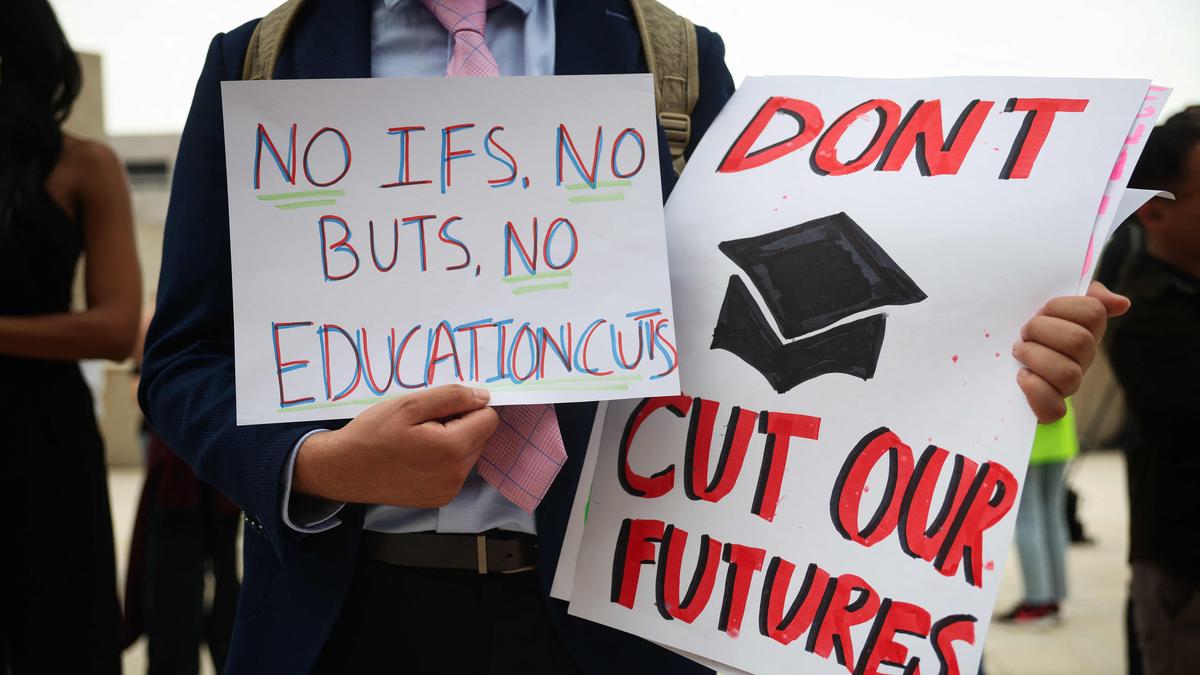A LinkedIn post by a former student of the Indian Statistical Institute, Kolkata, currently employed as a postdoc in a university of repute in the United States, caught me off guard a few days ago. He is actively seeking new positions where he may be able to leverage his experience in the biotech, pharma, or health-care analytics domains. He is a student who completed his doctorate in the U.S. and has a stellar publication record. Is his case an example of an immediate consequence of the fund cutting and the curbing of academic freedom by the Trump administration?
The U.S. has for long been the world leader in almost every area of research. The National Science Foundation (NSF), which was established in 1950, marked the beginning of the modern American research university. The National Institutes of Health (NIH), which go back to the late-19th century, saw significant expansion in the post-war years. Together, these two organisations transformed previously underperforming American scientific institutions into becoming the world’s pre-eminent research universities.
Disastrous disruptions
However, America’s higher education is almost in a mess ever since Donald Trump returned to the White House. The U.S. academic community is moving away from fundamental ideas of democracy and freedom as a result of Mr. Trump’s war on science. For example, Columbia University has agreed to enact a number of policy changes in response to threats from the Trump administration.
One research centre after another is being slashed or shut down by Mr. Trump and Elon Musk, whether it is at the NIH or the Environmental Protection Agency. Mr. Trump has made a move to completely dismantle the U.S. Department of Education. He has ordered widespread layoffs within federal science agencies, including senior positions at the National Oceanic and Atmospheric Administration (NOAA), the Centers for Disease Control and Prevention (CDC), and National Aeronautics and Space Administration (NASA). He has also terminated grants in specific research areas, taken unprecedented control over university affairs, and, in effect, threatened academic freedom.
Scientists who retain their jobs wonder whether they still have a place in American agencies and research institutes. There could be a fear of more hiring and funding freezes, data transfer limitations, and censorship related to gender studies, vaccine hesitancy, and climate change. The resultant rift in American society may continue and transform American culture for a generation even if the current university financing issue is resolved.
Early-career researchers are undoubtedly concerned about Mr. Trump’s disruptions because job cuts in federal research agencies and universities may increase competition and uncertainty. It may also be confusing for lakhs of international students aspiring to pursue doctoral studies in the U.S.
There could be a ‘research brain drain’
An editorial in the science journal, Nature, has described Mr. Trump’s actions as an “assault on science”. Science and its intrinsic economics, however, can still constitute the endless frontier. Mr. Trump’s policies are expected to reshape global academic flows — a worldwide vacancy is opening up as a large-scale academic exodus from the U.S. seems inevitable.
The possibility of a U.S. research brain drain is undoubtedly an opening for Europe and the rest of the world to promote themselves as a safe haven for unrestricted, free scientific research. “We can suddenly recruit talent that we would not have been able to attract under normal circumstances,” said Patrick Cramer, President of the Max Planck Society in Germany.
Michiel Scheffer of the European Innovation Council (EIC) announced on social media that “a concept” to invite scientists from the U.S. would be addressed in an April board meeting. The University of Aix-Marseille in France already announced “Safe Place for Science”. It has been in contact with other universities and the French government about expanding “scientific asylum” on a national and a European level. Also, countries such as China and South Korea have vowed to increase their efforts to recruit researchers impacted by Mr. Trump’s funding cuts. Some Ivy League professors, such as Yale University’s Jason Stanley, are now moving to Canadian universities. Professor Stanley, incidentally, is the author of the book, How Fascism Works (2018).
The repercussions
What are the potential long-term effects? “Of a low dishonest decade:/Waves of anger and fear/ Circulate over the bright/And darkened lands of the earth,/Obsessing our private lives.” These lines from the 1930s European setting described by British-American poet W.H. Auden in his poem, “September 1, 1939”, appear eerily applicable to America in the 2020s. Jews were denied the opportunity to work in universities in 1935 when the Nazis in Germany established the Nuremberg laws. As a result, approximately 2,600 Jewish scientists left Germany for Britain and America. While the science world was dominated by Germany up until 1935, the U.S. gained the leadership thereafter. Similar circumstances, but a reverse direction, of the academic exodus may ensue now.
Thus, Mr. Trump’s “assault on science” might have global repercussions. However, the flip side is that it will put a great deal of pressure on universities and research institutions around the world, including India, where it will affect the job market. Europe might not be able to accommodate all U.S. researchers wishing to relocate at a time when many European universities are dealing with budget deficits in a post-COVID-19 pandemic era under the looming threat of recession. Further, given that the North Atlantic Treaty Organization (NATO) is in danger of disintegrating, European nations in particular may need to raise their defence budgets.
As a result, the Indian academic environment may also experience an inward rush — many scholars may want to return from the U.S. The shades of uncertainty remain in the U.S., in Europe, and in India too.
Atanu Biswas is Professor of Statistics, Indian Statistical Institute, Kolkata
Published – April 09, 2025 12:08 am IST
